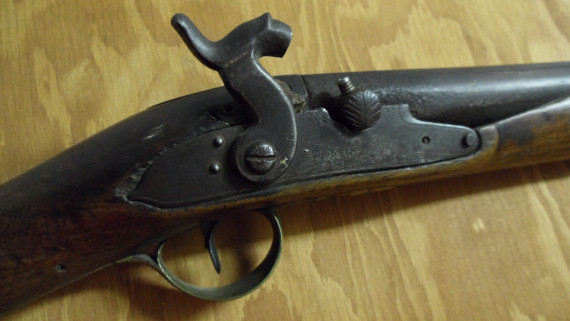UE.4.jpg

Christian Wehr's Muzzle-loading fowling musket, c.1805-1820.
Manufactured by Goodwin & Co., London, England.
Christian Wehr (1731- 1824) was an influential United Empire Loyalist who figured prominently in the opening and settlement of Missisquoi County. Loyal to the British Crown throughout the American Revolution, Wehr was a German Palatine descendant who petitioned Governor Haldimand for the legal right to own land east of Missisquoi Bay.
In a report to a British parliamentary commission investigating the reparation claims of Loyalists, Wehr, a displaced New York resident who had served his King well in General Burgoyne's army, as a captain in Jessup's Corps and as a lieutenant in Sir John Johnson's Regiment, the King's Royal Regiment of New York, detailed his losses which included: A good frame house, 30 acres cleared land, 2 cows, 2 heifers, 18 sheep, 14 hogs, Furniture and utensils, 5 sleigh loads of goods from the house, Trunk of clothes. To add insult to injury, a rebel captain moved
Manufactured by Goodwin & Co., London, England.
Christian Wehr (1731- 1824) was an influential United Empire Loyalist who figured prominently in the opening and settlement of Missisquoi County. Loyal to the British Crown throughout the American Revolution, Wehr was a German Palatine descendant who petitioned Governor Haldimand for the legal right to own land east of Missisquoi Bay.
In a report to a British parliamentary commission investigating the reparation claims of Loyalists, Wehr, a displaced New York resident who had served his King well in General Burgoyne's army, as a captain in Jessup's Corps and as a lieutenant in Sir John Johnson's Regiment, the King's Royal Regiment of New York, detailed his losses which included: A good frame house, 30 acres cleared land, 2 cows, 2 heifers, 18 sheep, 14 hogs, Furniture and utensils, 5 sleigh loads of goods from the house, Trunk of clothes. To add insult to injury, a rebel captain moved